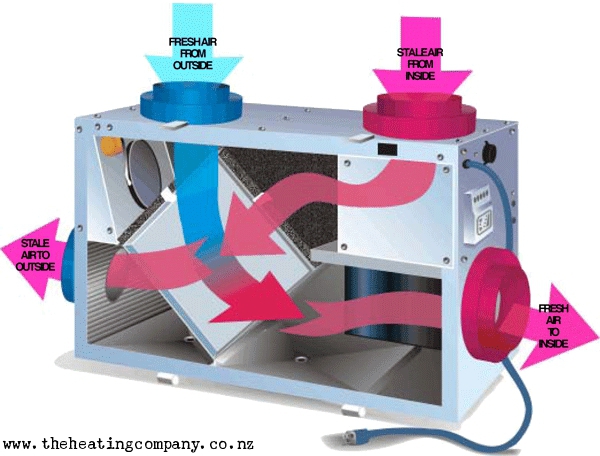
A heat recovery ventilation (HRV) system is by its nature designed to use the least amount of energy in its operation. Basically, in heat recovery Ventilation Systems NZ you will find two fans. One of those fans draws in air from the outside while the other removes the stall air in the room.
In most home, there is air to air heat exchanger which is mostly positioned in the roof space. This exchanger recovers heat from internal air before discharging it to the outside environment. This same system warms air coming to the room, using the heat recovered from the outgoing air. Here below are some of things you can do to increase the efficiency of these systems and reduce the power bills:
Go For Counter Flow System:
Home Ventilation Systems can be counter-flow or cross-flow. In the counter flow system, airflow enters air exchanger system from the opposite directions and the design is more efficiency. In most counter flow systems, the rate of efficiency is between 70% and 90%. In the cross flow exchanger systems, the airflow enter the system at right angles.
In terms of efficiency, cross flow systems rank lower than the counter flow systems at between 50% and 70% efficiency. Important to note is that the HRV System is not a home heating system. However, it can recover between 70% and 90% of heat within the exhaust air before being discharged to the outside.
Upgrade To Energy Star Systems:
The Modern HRV systems are energy star compliant and are designed to operate under low energy. If you still use the old HRV systems, discuss with your contractor how you can upgrade these systems to the modern ones. In addition to being energy efficient, the modern heat recovery ventilation systems are mostly noise free and some others have décor which can be integrated to the existing design in your home. You can get quotes from several HRV contractors in NZ, compare their rates and choose one which suits your budget and needs.
Insulate Your Home:
By insulating your home so as to prevent unnecessary losses of heat, you can improve the performance of the HRV systems. The material or type of insulation will determine how you have to depend on ventilation in buildings. If every opening in the house is sealed, you have no option but to rely on these systems otherwise you may suffocate therein. The level of insulation in most cases is dependent on the climatic conditions in your area. If the temperatures are generally too cold, then total insulation is required and you may have no much freedom in customizing or modifying the way in which the HRV system operates.

